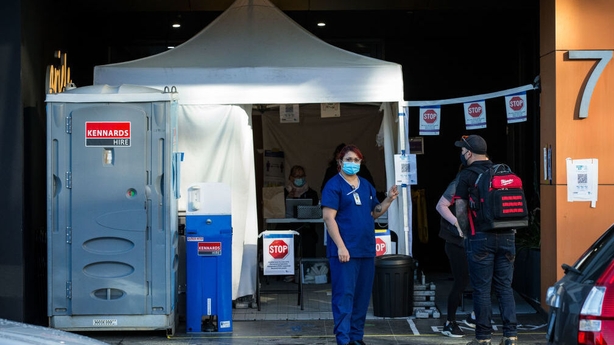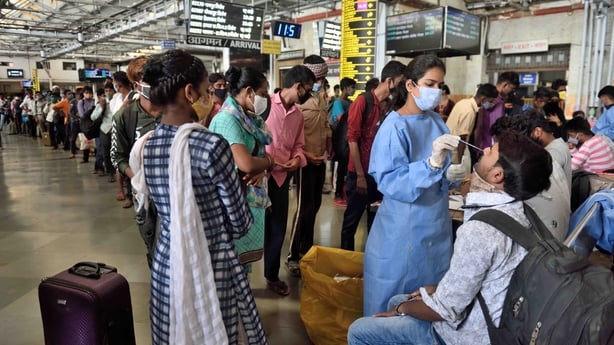A further 48,553 cases of Covid-19 were confirmed across the UK today, as case numbers continue to rise ahead of the lifting of most restrictions in England this Monday.
A further 63 people had died within 28 days of testing positive for Covid-19 as of today, the highest day-on-day rise since March 26. It brings the UK total to 128,593.
Two regions of England are recording their highest rate of new Covid-19 cases since comparable figures began in summer 2020, when mass testing was first introduced across the UK.
The North East recorded 835.8 cases per 100,000 people in the week to July 11, while Yorkshire and the Humber recorded 462.7 per 100,000, according to the latest Covid-19 surveillance report from Public Health England.
All other regions are recording their highest rate since January.
Case rates are also rising for all age groups, with 20 to 29-year-olds recording the highest rate of 747.3 cases per 100,000 people.
It is the highest rate for this age group since the week to January 10.
Both five to nine-year-olds (297.3 cases per 100,000) and 10 to 19-year-olds (729.1) are recording their highest rates since comparable figures began.
The figures reflect the impact of the third wave of coronavirus, which is continuing to drive a sharp increase in cases along with a slow but steady rise in hospitalisations.
Responding to the figures, Dr Yvonne Doyle, medical director at Public Health England, warned that despite more Covid-19 restrictions easing in England on Monday July 19, the virus had not gone away.
"Case and hospitalisation rates continue to rise," she said. "We must all be sensible. Remember it is safer to be outside when mixing with friends and family and when inside, open windows to help ventilation.
"The best way to protect yourself is to have both doses of the vaccine as soon as you are offered. Do not delay.
"We should all continue to get tested twice a week and anyone who has symptoms should seek a test immediately and stay at home while they await their result."
Covid-19 hospital admissions in England stood at 4.4 per 100,000 people in the week to July 11, the highest rate since the week to March 14.
Stark warning from World Health Organization
The World Health Organization (WHO) warned today that "more dangerous" variants of Covid-19 could tear across the world as global infections soared to half a million daily, largely driven by the virulent Delta strain.
An AFP tally of official sources found that after an initial dip, cases have been rising again worldwide since the end of June, topping 540,000 on Tuesday and again on Wednesday.
"The pandemic is nowhere near finished," the WHO's emergency committee said in a statement.
It highlighted "the strong likelihood for the emergence and global spread of new and possibly more dangerous variants of concern that may be even more challenging to control".
The virus has reappeared in places long believed to have dodged the worst of the pandemic, with Australia - lauded for its successful "Covid zero" strategy - facing a resurgence that has grown to almost 1,000 cases nationwide in a month.
Further lockdowns in Australia
Australia's bid to quash a fast-spreading coronavirus outbreak will see its second largest city lock down late today, bringing the total number of Australians under stay-at-home orders to around 12 million.
Melbourne and the rest of Victoria will join Sydney in a "hard and fast" lockdown, state premier Dan Andrews said, as Australia battles an outbreak of the Delta variant.
The largely Covid-free country has recorded nearly 1,000 cases of the strain nationwide in the last month.
Andrews said he took the decision to return Melbourne to its fifth lockdown "with a heavy heart" but it was an "absolute necessity".

"Nothing about this virus is fair," he said, describing how just 18 cases in Victoria had mixed with thousands of contacts who must now be traced and tested.
"You only get one chance to go hard and go fast," he said.
"If you wait, if you hesitate, if you doubt, then you will always be looking back wishing you had done more earlier."
The lockdown will begin shortly before midnight local time on Thursday and last five days.
Australia's largest city, Sydney, is already in its fourth week of lockdown, after the virus spread from overseas aircraft workers to their local driver in mid-June.
Sydney authorities said Thursday that the situation had "stabilised" -- with 65 new cases reported in the last 24 hours.
But the lockdown is set to continue for two more weeks to try and eliminate any community transmission.
Authorities concerned over potential 'superspreader' events in India
A rise in India's Covid-19 infection rate is worrying authorities who are concerned that pilgrimages and tourism could prove to be "superspreader" events in the battle to douse a devastating second wave of infections that has killed thousands.
In a pilgrimage this month, thousands of Hindus are set to walk hundreds of miles across northern cities, carrying pitchers of water from the Ganges, a river they consider sacred.
The pilgrims could act as "super spreaders" and set off a third wave of infections, a top medical body has warned.

The Supreme Court this week questioned federal and state authorities in the most populous state of Uttar Pradesh why the mass religious gathering should be allowed.
The home ministry flagged the increase in the infective rate as a cause for concern in some states, urging officials nationwide to enforce social distancing and clamp down on overcrowding at tourist sites.
"We must guard ourselves against complacency and laxity, which creep in as positivity declines," Home Secretary Ajay Bhalla told them in a letter on Wednesday, at a time when most cities have lifted strict lockdowns

